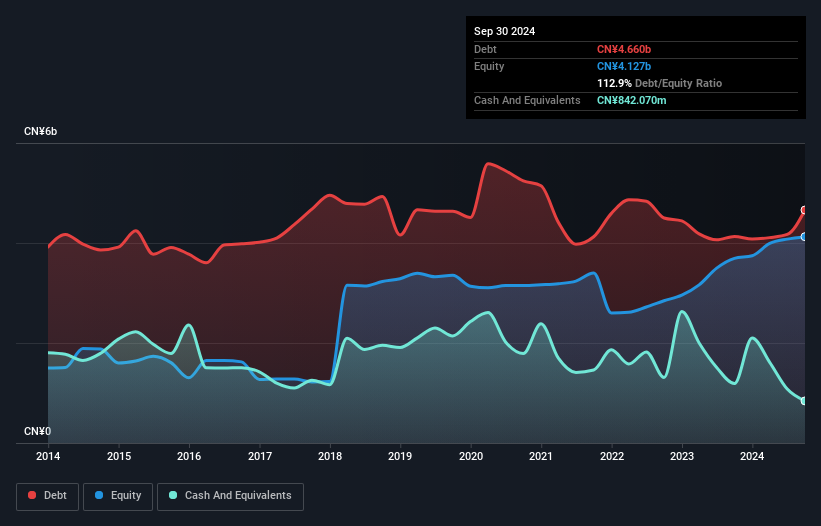These 4 Measures Indicate That Chongqing Taiji Industry(Group)Ltd (SHSE:600129) Is Using Debt Extensively

Warren Buffett famously said, 'Volatility is far from synonymous with risk.' It's only natural to consider a company's balance sheet when you examine how risky it is, since debt is often involved when a business collapses. We note that Chongqing Taiji Industry(Group) Co.,Ltd (SHSE:600129) does have debt on its balance sheet. But should shareholders be worried about its use of debt?
Why Does Debt Bring Risk?
Generally speaking, debt only becomes a real problem when a company can't easily pay it off, either by raising capital or with its own cash flow. In the worst case scenario, a company can go bankrupt if it cannot pay its creditors. However, a more frequent (but still costly) occurrence is where a company must issue shares at bargain-basement prices, permanently diluting shareholders, just to shore up its balance sheet. Of course, the upside of debt is that it often represents cheap capital, especially when it replaces dilution in a company with the ability to reinvest at high rates of return. The first step when considering a company's debt levels is to consider its cash and debt together.
View our latest analysis for Chongqing Taiji Industry(Group)Ltd
What Is Chongqing Taiji Industry(Group)Ltd's Debt?
As you can see below, at the end of September 2024, Chongqing Taiji Industry(Group)Ltd had CN¥4.66b of debt, up from CN¥4.13b a year ago. Click the image for more detail. However, because it has a cash reserve of CN¥842.1m, its net debt is less, at about CN¥3.82b.

How Healthy Is Chongqing Taiji Industry(Group)Ltd's Balance Sheet?
We can see from the most recent balance sheet that Chongqing Taiji Industry(Group)Ltd had liabilities of CN¥9.21b falling due within a year, and liabilities of CN¥997.2m due beyond that. On the other hand, it had cash of CN¥842.1m and CN¥3.16b worth of receivables due within a year. So it has liabilities totalling CN¥6.21b more than its cash and near-term receivables, combined.
This deficit isn't so bad because Chongqing Taiji Industry(Group)Ltd is worth CN¥13.7b, and thus could probably raise enough capital to shore up its balance sheet, if the need arose. But it's clear that we should definitely closely examine whether it can manage its debt without dilution.
We use two main ratios to inform us about debt levels relative to earnings. The first is net debt divided by earnings before interest, tax, depreciation, and amortization (EBITDA), while the second is how many times its earnings before interest and tax (EBIT) covers its interest expense (or its interest cover, for short). Thus we consider debt relative to earnings both with and without depreciation and amortization expenses.
Chongqing Taiji Industry(Group)Ltd's debt is 3.3 times its EBITDA, and its EBIT cover its interest expense 6.4 times over. Taken together this implies that, while we wouldn't want to see debt levels rise, we think it can handle its current leverage. Importantly, Chongqing Taiji Industry(Group)Ltd's EBIT fell a jaw-dropping 24% in the last twelve months. If that earnings trend continues then paying off its debt will be about as easy as herding cats on to a roller coaster. There's no doubt that we learn most about debt from the balance sheet. But ultimately the future profitability of the business will decide if Chongqing Taiji Industry(Group)Ltd can strengthen its balance sheet over time. So if you're focused on the future you can check out this free report showing analyst profit forecasts.
Finally, while the tax-man may adore accounting profits, lenders only accept cold hard cash. So it's worth checking how much of that EBIT is backed by free cash flow. Over the last three years, Chongqing Taiji Industry(Group)Ltd reported free cash flow worth 5.8% of its EBIT, which is really quite low. That limp level of cash conversion undermines its ability to manage and pay down debt.
Our View
We'd go so far as to say Chongqing Taiji Industry(Group)Ltd's EBIT growth rate was disappointing. But at least it's pretty decent at covering its interest expense with its EBIT; that's encouraging. Overall, we think it's fair to say that Chongqing Taiji Industry(Group)Ltd has enough debt that there are some real risks around the balance sheet. If all goes well, that should boost returns, but on the flip side, the risk of permanent capital loss is elevated by the debt. When analysing debt levels, the balance sheet is the obvious place to start. But ultimately, every company can contain risks that exist outside of the balance sheet. We've identified 2 warning signs with Chongqing Taiji Industry(Group)Ltd (at least 1 which doesn't sit too well with us) , and understanding them should be part of your investment process.
Of course, if you're the type of investor who prefers buying stocks without the burden of debt, then don't hesitate to discover our exclusive list of net cash growth stocks, today.
New: AI Stock Screener & Alerts
Our new AI Stock Screener scans the market every day to uncover opportunities.
• Dividend Powerhouses (3%+ Yield)
• Undervalued Small Caps with Insider Buying
• High growth Tech and AI Companies
Or build your own from over 50 metrics.
Have feedback on this article? Concerned about the content? Get in touch with us directly. Alternatively, email editorial-team (at) simplywallst.com.
This article by Simply Wall St is general in nature. We provide commentary based on historical data and analyst forecasts only using an unbiased methodology and our articles are not intended to be financial advice. It does not constitute a recommendation to buy or sell any stock, and does not take account of your objectives, or your financial situation. We aim to bring you long-term focused analysis driven by fundamental data. Note that our analysis may not factor in the latest price-sensitive company announcements or qualitative material. Simply Wall St has no position in any stocks mentioned.
About SHSE:600129
Chongqing Taiji Industry(Group)Ltd
Develops, produces, and sells traditional Chinese and modern medicine products in China and internationally.
Undervalued slight.
Market Insights
Community Narratives




